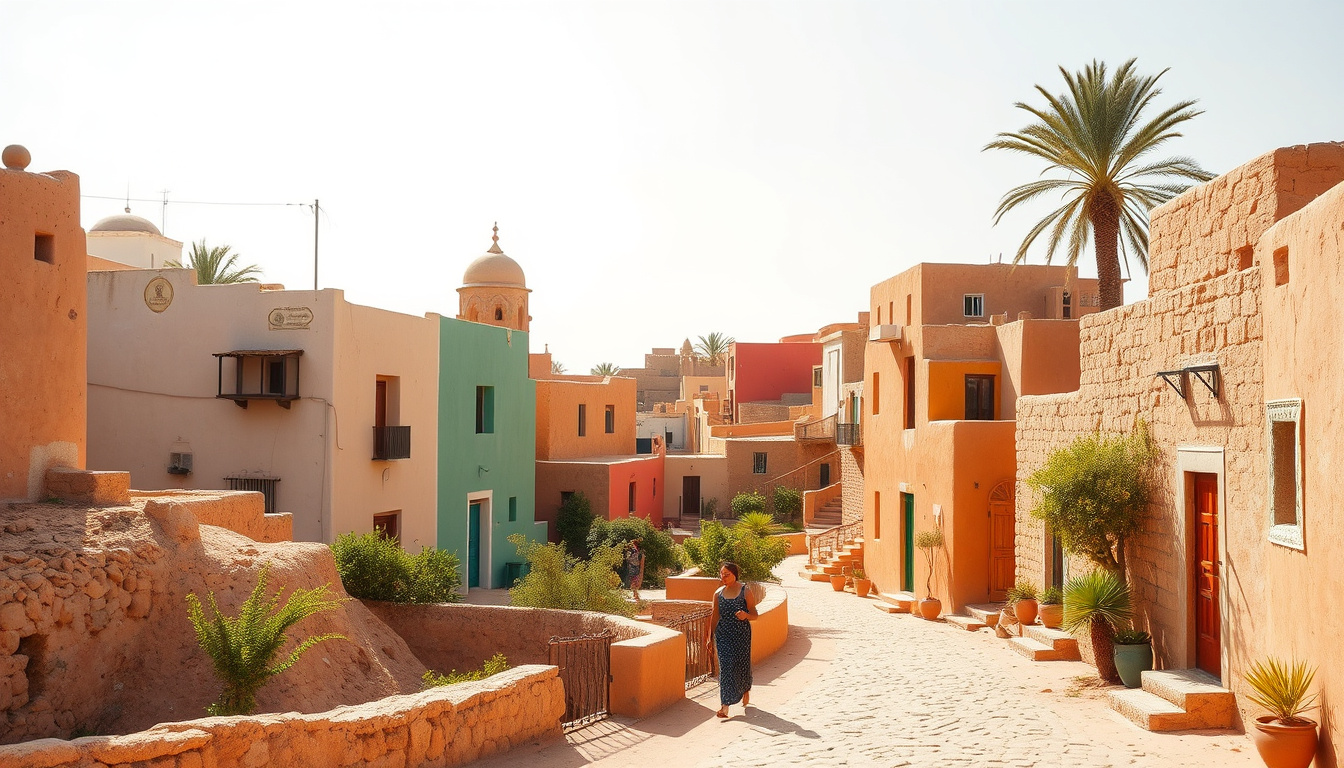Traveling through Egypt often conjures visions of awe-inspiring pyramids, sprawling deserts, and bustling bazaars. Yet, beyond the well-trodden paths lies a treasure trove of culture, history, and warmth— the Nubian villages along the Nile, offering an authentic glimpse into a unique way of life. In Episode 18 of our Budget Travel Adventure, we embark on an immersive journey to explore these vibrant communities near Aswan. From visiting a local school to sharing a meal with a Nubian family, this episode reveals the heart and soul of Egypt’s hidden gems.
Discovering Nubian Villages: A Cultural Tapestry
The Nubian people, one of Egypt’s oldest ethnic groups, inhabit a stretch of land along the Nile in southern Egypt and northern Sudan. Their villages are distinct in colorful architecture, rich folklore, and deep-rooted traditions, standing in contrast to urban Egypt’s modern pace.
Our adventure begins in an unassuming Nubian village near Aswan, accessible via a short felucca (traditional wooden sailboat) ride from the city. The vibrant houses, usually painted in bright blues, yellows, and reds, immediately convey a welcoming spirit—a positive contrast to the intense desert surroundings.
Visiting a Nubian School: Education in the Heart of the Village
One of the most enlightening parts of the journey was stepping into a local Nubian school. Seeing the children engage eagerly in lessons, using both Arabic and Nubian languages, was inspiring. The school’s modest facilities are a testament to the community’s commitment to education despite limited resources.
The classes blend traditional teachings with modern subjects, reflecting the Nubian people’s desire to preserve their heritage while embracing the future. Teachers emphasize oral history and storytelling, ensuring that Nubian culture continues thriving through younger generations. Visitors can often observe interactive lessons, including music and art, showcasing the vibrant arts scene rooted in the village.
Meeting the Locals: Hospitality in a Nubian Home
No visit to a Nubian village is complete without experiencing the famed hospitality of its people. Invited into the home of a local family, we witnessed firsthand the warmth and generosity Nubians are known for. The household, modest yet vibrantly decorated with traditional Nubian motifs, exuded a comforting atmosphere.
Sharing a home-cooked meal made from fresh, local ingredients—often including dishes such as fatta (rice and bread with meat broth) and molokhia (a flavorful green leafy stew)—highlighted the culinary traditions passed down through generations. Conversations flowed easily, revealing stories of daily life, family customs, and the challenges and joys of living in the shadow of the Nile.
Returning to Aswan: Reflections on a Unique Experience
After a fulfilling day immersed in Nubian culture, our journey concluded as we sailed back to Aswan. The gentle sway of the felucca along the Nile, bordered by palm groves and desert hills, provided time to reflect on the authentic connections and new understandings gained from this intimate encounter.
Aswan itself, a gateway to the south of Egypt, offers a comfortable base for exploring Nubian villages, with budget accommodations and easy transport options making it ideal for travelers seeking both adventure and accessibility.
Why Explore Nubian Villages?
Exploring Nubian villages offers a refreshing perspective for travelers looking to venture beyond Egypt’s popular landmarks. Key reasons to include these villages in your itinerary include:
- Cultural Immersion: Engage with a community proud of its unique language, art, and traditions.
- Authentic Experiences: Participate in daily village life, from schooling to family meals.
- Stunning Scenery: Enjoy the juxtaposition of the lush Nile banks and arid desert landscapes.
- Support Local Communities: Tourism can empower Nubian people to preserve their heritage and improve living standards.
Planning Your Visit: Tips for Budget Travelers
- Getting There: From Aswan, take a short boat ride to reach nearby Nubian villages; feluccas are affordable and offer a scenic route.
- Respect Local Customs: Dress modestly, ask permission before photographing people, and be mindful of cultural sensitivities.
- Stay Local: Accommodations range from homestays to guesthouses, fostering deeper connections and supporting the community.
- Engage Respectfully: Learn a few words in Nubian or Arabic as a sign of goodwill.
Frequently Asked Questions (FAQ)
Q1: Where are Nubian villages located in Egypt?
A1: Nubian villages are primarily situated along the Nile River near Aswan in southern Egypt, extending into northern Sudan.
Q2: What makes Nubian culture unique?
A2: Nubian culture is distinguished by its language, vibrant house colors, rich oral traditions, music, and cuisine—all preserved through centuries despite external influences.
Q3: Is it safe to visit Nubian villages as a solo traveler?
A3: Yes, Nubian villages are generally safe, and locals are welcoming to travelers. However, standard travel precautions, such as respecting customs and traveling during daylight, are advisable.
Q4: Can travelers stay overnight in Nubian villages?
A4: Yes, several villages offer homestays and guesthouses where visitors can experience authentic village life.
Q5: What is the best time to visit Nubian villages?
A5: The cooler months, from October to April, are ideal for visiting due to milder temperatures and more comfortable travel conditions.
Conclusion: Embracing Egypt’s Hidden Treasures
Exploring Nubian villages unveils a side of Egypt often overshadowed by its monumental ancient history. It introduces travelers to vibrant communities where culture, tradition, and daily life flow with the rhythm of the Nile. Episode 18 of our Budget Travel Adventure not only highlights the beauty and resilience of Nubian life but also invites curious explorers to engage with Egypt beyond its famed landmarks. For those seeking meaningful travel that balances discovery, cultural exchange, and affordability, Nubian villages near Aswan stand as an inspiring destination not to be missed.

